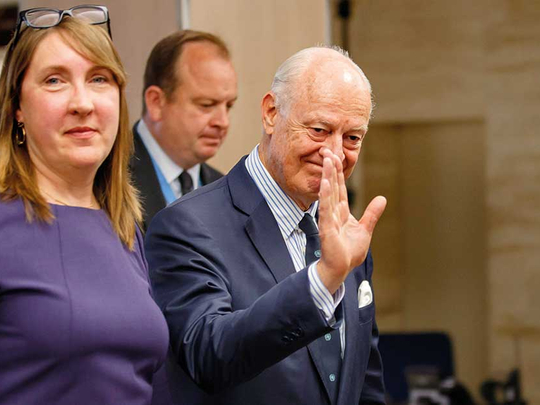
Geneva: The UN’s envoy for Syria on Monday opened a new round of indirect talks, the seventh so far, between Syrian government representatives and opposition leaders to try to wind down the battered country’s civil war.
The start of the talks in Geneva coincided with the first full day of a cease-fire for southern Syria that was brokered last week by the United States, Russia and Jordan.
Opposition activist Ahmad Al Masalmeh said it was quiet in the city of Dara’a, near the Jordanian border. The Britain-based Syrian Observatory for Human Rights monitoring group reported light shelling and bombardment in the city overnight.
The agreed-on cease-fire covers three war-torn provinces in southern Syria. It’s the first tangible outcome following months of strategy and diplomacy between the new Trump administration and Russian President Vladimir Putin’s Moscow.
The Geneva talks are expected to last through the week. UN envoy Staffan de Mistura declined to comment on his expectations but was due to hold a news conference later in the day. In principle, the new round of Geneva negotiations will focus on four so-called “baskets”: a new constitution, governance, elections and combating “terrorism”.
De Mistura will be shuttling between the two sides, which have so far only faced each other in ceremonial meetings that have been short on substance. The UN envoy was first to meet with representatives from Syrian President Bashar Al Assad’s government on Monday, before a meeting later with opposition representatives.
The UN-led diplomatic efforts seek partly to ensure humanitarian aid deliveries to Syria and plan for the day after the war is over.
The Syrian opposition is determined to achieve a political transition in Damascus, while Al Assad’s government insists the talks should prioritise “the war on terror.” Deputy Special Envoy Ramzy Ramzy said in Damascus on Saturday the talks would address both matters in parallel.
Meanwhile, Syrian government forces retook the Al Hail gas field in central Syria from Daesh militants, the army reported. The government and its Iranian backers have been advancing through the country’s Homs province to secure vital resources they lost early in the war. Their declared aim is to relieve Syrian soldiers who have been under Daesh siege in the city of Deir Al Zor, a vital hub for resource commerce in Syria.
Oil and Mineral Resources Minister Ali Ganem said Syria was producing 10 million cubic metres of gas a day — roughly half of its pre-war output of 21 million cubic metres a day.
Separately, the Al Qaida-linked Levant Liberation Committee group said on social media it detained 123 Daesh fighters in northwest Idlib province, a rebel-held corner of the country where the group is largely in control. The Observatory also reported the detentions on Sunday.
Al Assad’s government has refused to entertain talk of the president’s departure. He inherited power from his father, the late Hafez Al Assad, in 2000 and has held on despite the devastating civil war. Half of the country’s population has been displaced, and some 400,000 people have been killed in the violence since 2011.












